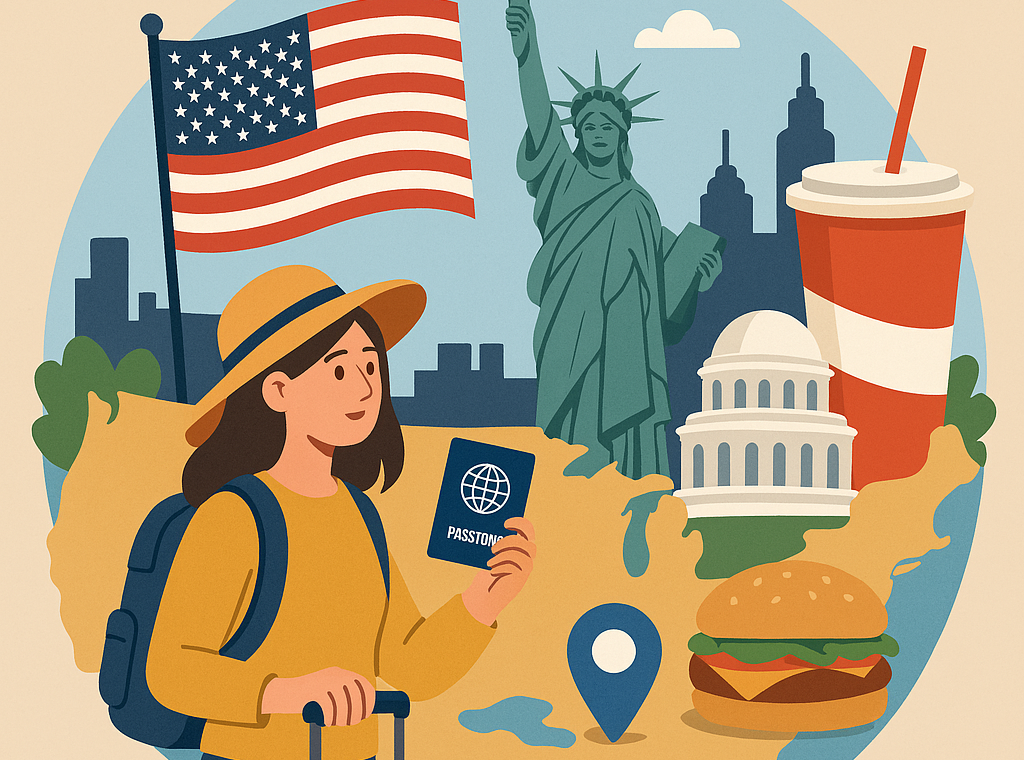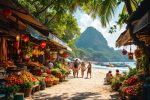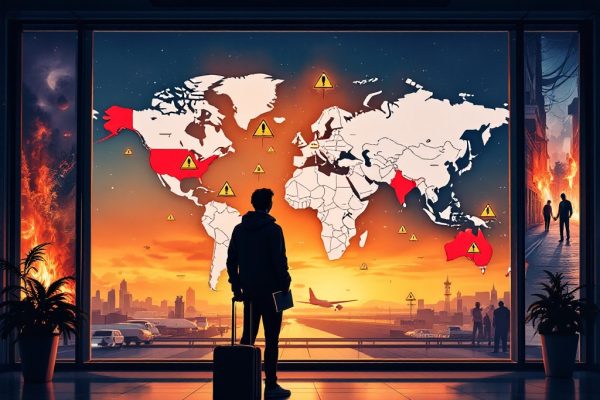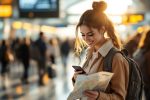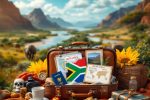What to Know Before Traveling to the USA
Dreaming of a US adventure? From vibrant cities to breathtaking national parks, the USA offers unforgettable experiences. This comprehensive guide covers everything you need for a smooth trip, from visa requirements and health precautions to cultural insights and essential safety tips. Discover how to navigate customs, understand tipping etiquette, and plan your itinerary like a pro. Start your journey now and unlock the secrets to an amazing American experience!
Important information
- Ensure you have a valid passport and any necessary visas. Travel insurance is highly recommended due to the high cost of US healthcare. Research US customs regulations on prohibited items.
- Book accommodations and transportation in advance, particularly during peak season. Reserve popular attractions and tours ahead of time. Pack for diverse weather conditions and remember essential medications.
- Familiarize yourself with US tipping customs (generally 15-20% for services). Be mindful of cultural norms like personal space and polite greetings. Understand that regional customs vary across the country.
- Protect yourself from petty theft, which is common in tourist areas. Secure your valuables and be aware of your surroundings. Use reliable transportation and avoid poorly lit areas at night.
- Most purchases are subject to sales tax, which varies by state. Credit cards, debit cards, and cash are widely accepted. Mobile payment options are also becoming more common.
Essential Travel Preparations for the USA
Planning your US trip? Ensure a smooth arrival by checking visa and entry requirements. Don’t overlook travel insurance and necessary health precautions.For an immersive experience, consider a trip of at least ten days. Focusing on one region allows you to truly appreciate its unique offerings. Longer trips open up possibilities for multi-region exploration. Remember, major cities can easily fill a week or more.Before you depart, research US customs regulations on permissible items to prevent any border complications. Explore the specific laws and cultural nuances of your chosen destination, as the USA offers a diverse landscape.
Travel Preparations
- Book accommodations and transportation in advance, especially during peak season.
- Secure reservations for popular hikes and museums.
- Check for closures, particularly on Mondays.
Essential Tips
- Pack appropriate clothing for varying weather conditions.
- Familiarize yourself with US tipping customs.
- Avoid over-planning to allow for spontaneous adventures.
- Ensure your passport and visas are valid and up-to-date.
Embrace flexibility and enjoy your US adventure!
Visa and Entry Regulations
Returning to the US? Don’t forget your passport! Also, be sure to declare everything you’re bringing back with you. It’s a good idea to review what’s prohibited by US Customs before your trip to avoid any issues. Leave anything illegal at home.
Document Requirements and CBP Declaration Form 6059B
Visitors to the U.S. must complete CBP Declaration Form 6059B, which details the items they are bringing into the country. Customs and Border Protection officers are authorized to inspect travelers and their possessions.
Travel Insurance and Health Precautions
Navigating the US healthcare system can be costly, making travel insurance essential for your trip. Opt for comprehensive coverage that encompasses medical emergencies and potential evacuations. Remember to pack necessary medications, but verify any restrictions on bringing medications from overseas. It’s crucial to be prepared for any health issues that may arise during your travels.
Understanding Cultural Norms and Customs in the USA
Planning a trip to the US? Familiarizing yourself with American culture can greatly enhance your experience. The country’s diversity creates a fascinating tapestry of regional customs. While Americans are generally patriotic, discussing politics and social issues requires sensitivity and respect for differing opinions. Simple courtesies go a long way, such as respecting personal space (an arm’s length is a good guideline) and offering polite greetings like “How are you?”. Public displays of affection are generally acceptable, but excessive displays may be frowned upon depending on the region. By being mindful of these cultural nuances, you’ll pave the way for positive interactions with Americans. Here are a few tips to help you navigate American culture:
Respect Personal Space
Maintain an arm’s length distance when interacting with someone you don’t know well. This shows respect for their personal space and helps avoid any discomfort.
Offer Polite Greetings
A simple “How are you?” or “Good morning/afternoon/evening” goes a long way in establishing positive interactions. Even a brief acknowledgment can make a difference.
Be Mindful of Public Displays of Affection
While public displays of affection are generally acceptable, it’s best to avoid excessive displays, especially in more conservative regions.
Respect Differing Opinions
Americans value freedom of speech, but discussing sensitive topics like politics and social issues requires tact and respect for diverse viewpoints.
American Mentality and Social Conventions
Americans highly value independence and self-reliance, communicating directly and expressing their opinions openly. Casual chats are a common way to show friendliness, often revolving around topics like the weather or sports.
Maintaining eye contact demonstrates respect and attentiveness. However, cultural sensitivity is crucial; avoid stereotypes and be open to diverse perspectives, as American customs can vary based on individual backgrounds.
Time is precious to Americans, so punctuality is essential in both professional and social situations. Respecting personal space, about an arm’s length, is also considered polite.
Cultural Differences and Sensitivity
Exploring the US? Understanding cultural nuances can significantly enhance your trip. Respectful interactions with diverse individuals will enrich your journey.
Communication
- Maintaining eye contact demonstrates respect.
- Respecting personal space is crucial.
- Avoid casual discussions about sensitive topics like politics or religion.
Etiquette
- Greetings are typically informal, often with a handshake.
- Appropriate attire varies depending on the region and occasion.
- In professional environments, use titles and last names until invited to use first names.
Pre-trip research on local customs demonstrates respect and improves your experience. Plan ahead, and enjoy your American adventure!
American Customs and Etiquette
In the US, “How are you?” is a common greeting, more polite than probing. Respect personal space by staying an arm’s length away. While public displays of affection are generally acceptable, avoid discussing politics or religion with strangers.
Politeness and respect for local customs are key. Tipping, for instance, is customary in many service industries to show appreciation. A smile and eye contact also convey friendliness and respect.
Regional Diversity and Multicultural Population
The US, a melting pot of cultures, is shaped by both immigration and its indigenous heritage. This diverse mix creates distinct regional differences in traditions, food, and social norms.
Southern hospitality and unique cuisine contrast sharply with the fast-paced cities of the Northeast.
The West Coast offers a more relaxed atmosphere, heavily influenced by Pacific Rim cultures.
Meanwhile, the Midwest emphasizes community and farming. This vibrant tapestry of traditions contributes to the nation’s rich cultural landscape.
Key Travel Tips for Visiting the USA
Plan Your Trip
Start by researching your destination, booking accommodations and transportation. Gather crucial documents like your passport and any necessary visas. Travel insurance is also recommended. Pack appropriate clothing and any required medications.
Understand American Customs
Familiarize yourself with American customs, such as tipping practices. Research appropriate tipping amounts and learn local laws and regulations. Knowing basic phrases and being respectful of cultural differences will enhance your experience.
Expedite Entry
Consider Mobile Passport Control or Trusted Traveler Programs to expedite your entry process. Familiarize yourself with customs procedures and have your documents ready. Answer questions truthfully and declare all items you are bringing. Be aware of prohibited items.
Plan Activities
Plan activities but remain flexible. Research local attractions and events. Booking tours in advance is advisable, especially during peak seasons. Consider your transportation options within your destination.
Preparing a Travelers Checklist
- When preparing for your trip, remember your passport and any necessary visas.
- Pack essential medications and a first-aid kit for unexpected situations.
- Choose versatile clothing suitable for various weather conditions and activities.
- Don’t forget electronics, chargers, and adapters to stay connected.
- A reusable water bottle and snacks will keep you refreshed on the go.
- A copy of your itinerary and important contacts is also recommended.
- For hiking trips, pack layers to adapt to quickly changing mountain weather.
Top Ten Travel Tips and Recommendations
Secure your passport and any required visas, ensuring they’re valid.
Check the reservation system for popular destinations like national parks and book ahead if necessary.
Obtain travel insurance for protection against medical emergencies, cancellations, and lost luggage.
Familiarize yourself with US customs regulations and prohibited items to ensure a smooth arrival.
Understand and respect local customs and laws for a positive experience.
Pack appropriate clothing and essentials based on the weather and your planned activities.
Learning basic English phrases can enhance communication, but exercise caution with street vendors, verifying their legitimacy.
Research reliable transportation options, including public transport, ride-sharing apps, and car rentals.
Prioritize safety by staying aware of your surroundings.
Mobile Passport Control and Trusted Traveler Programs
Mobile Passport Control (MPC)
Mobile Passport Control (MPC) is a free app that expedites entry into the United States for American and Canadian citizens. Eligible travelers submit their passport and customs information electronically through the app, simplifying arrival at participating US airports and seaports.
Trusted Traveler Programs (TTPs)
Trusted Traveler Programs (TTPs), such as Global Entry, NEXUS, and SENTRI, offer expedited processing to pre-approved, low-risk travelers. While TTPs involve an application, background check, interview, and fee, members enjoy dedicated airport lanes and faster land border processing, making travel significantly smoother and more efficient.
What to Expect at Customs Inspections
Upon arriving in the U.S., CBP officers will inspect you and your belongings. Declare everything you’re bringing into the country. For a smoother process, have your passport and CBP Declaration Form 6059B readily available.
Understanding the Tipping System
Tipping practices in the United States vary depending on the service provided. In restaurants, servers typically receive 15-20% of the pre-tax bill. For more elaborate coffee orders, a dollar or more is customary. Bartenders generally receive 15-20% per drink. When traveling, hotel and airport porters usually get $2 per bag. Taxi drivers typically expect 10-15% of the fare. For hotel housekeepers, a few dollars per day is a thoughtful gesture.
Restaurant Servers
15-20% of the pre-tax bill
Coffee Orders
$1 or more for complicated orders
Bartenders
15-20% per drink
Hotel/Airport Porters
$2 per bag
Taxi Drivers
10-15% of the fare
Hotel Housekeepers
A few dollars per day
Health and Safety Considerations for Travelers
Planning a trip to the USA? Don’t forget these essential health and safety reminders.
Health
- US healthcare can be expensive, so travel insurance with medical coverage is a wise investment.
- Some vaccinations may be required or recommended depending on your origin country, consult your doctor for personalized advice.
Safety
- Before departure, check travel advisories and safety guidelines for your specific destinations.
- Petty theft is prevalent in tourist hotspots, so secure your valuables and remain vigilant.
- Crime rates vary across locations, so research your destinations and take appropriate precautions.
- To stay safe in public, keep a close eye on your belongings, avoid poorly lit areas, and use reliable transportation.
A little planning goes a long way toward a safe and enjoyable trip.
Healthcare Costs and Safety Concerns
Before your trip to the US, obtain comprehensive travel insurance, as healthcare can be expensive. Understanding how to access local medical care is crucial in case of illness or injury during your travels. Preparation is key.
Petty Theft and Crime Awareness
Pickpocketing is more prevalent than violent crime in the USA, posing a significant risk to tourists, particularly in crowded areas and popular attractions. Safeguard your belongings by keeping valuables concealed. Exercise heightened caution in your vehicle, especially when storing items out of sight. When withdrawing cash, opt for well-lit, busy ATMs for increased safety. Consider using a money belt or hidden pouch to protect your cash and cards.
Safety Protocols in Public Spaces
Finding a public restroom can be tricky. Plan ahead and locate restrooms in advance. Always carry hand sanitizer.
What to Know About Shopping and Purchases
Take advantage of duty-free shopping for specific goods, but be mindful of the restrictions. Some items, like certain foods, plants, and animal products, are prohibited.
Paying in the USA is easy, with credit cards, debit cards, and cash widely accepted. Remember that sales tax, which varies by state, will be added to your purchases.
Duty Exemptions and Prohibited Merchandise
Most personal belongings can enter the U.S. duty-free. However, this exemption doesn’t apply to items intended for resale. Food products may face import restrictions, so it’s always best to consult the prohibited items list before traveling.
Sales Tax and Payment Methods
Most states levy a sales tax on purchases. Buyers can pay with credit cards, debit cards, or cash. Increasingly, mobile payment options are also becoming popular.

